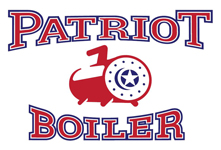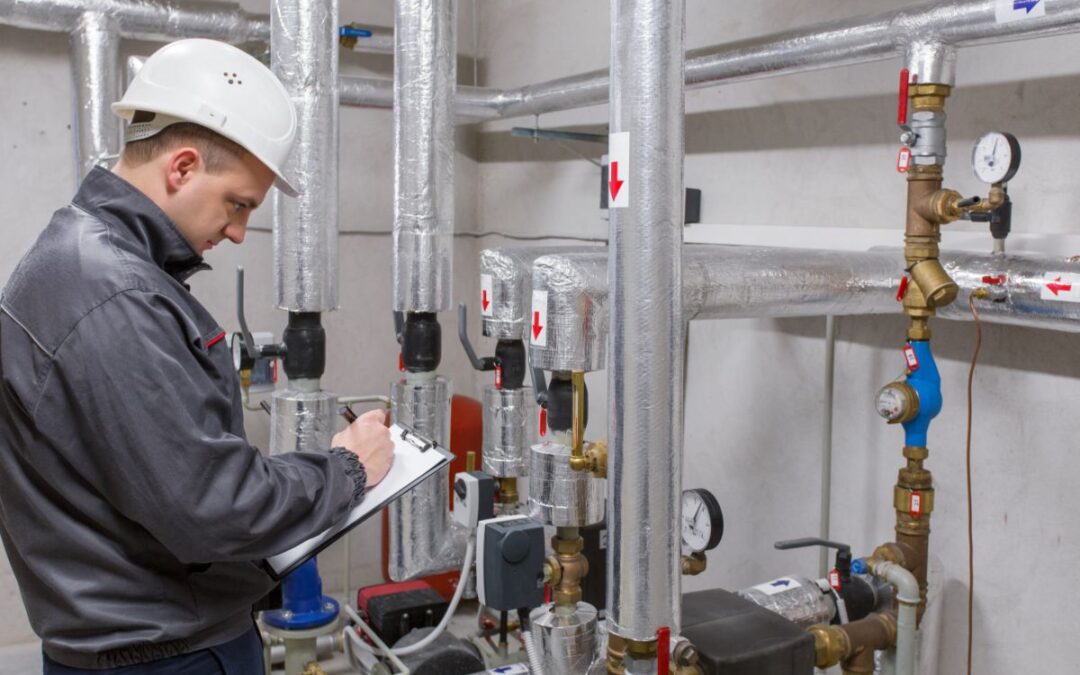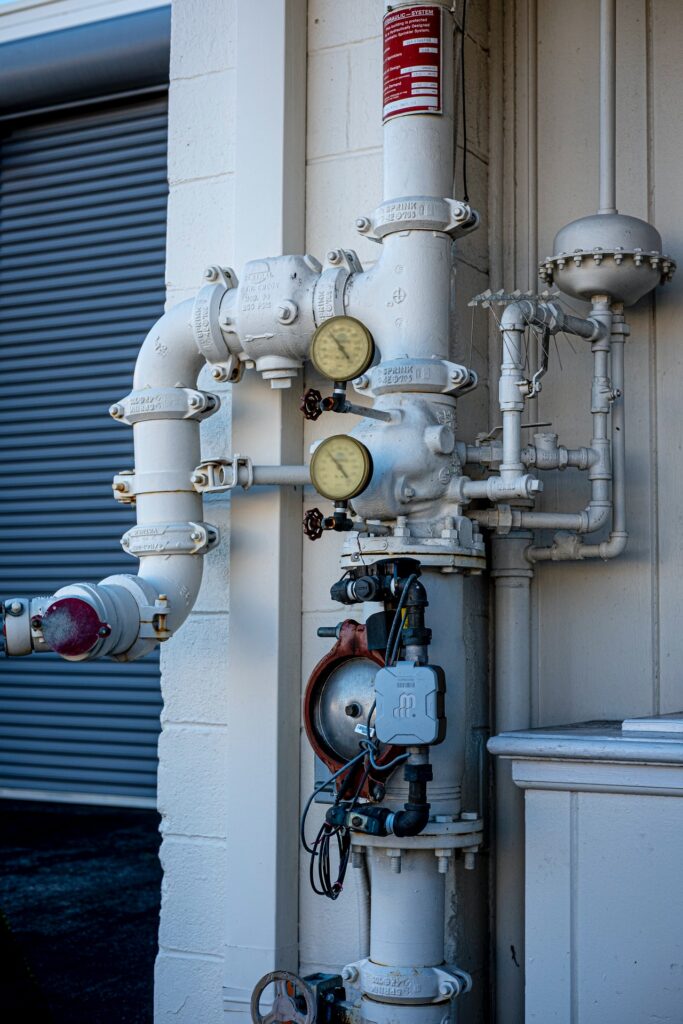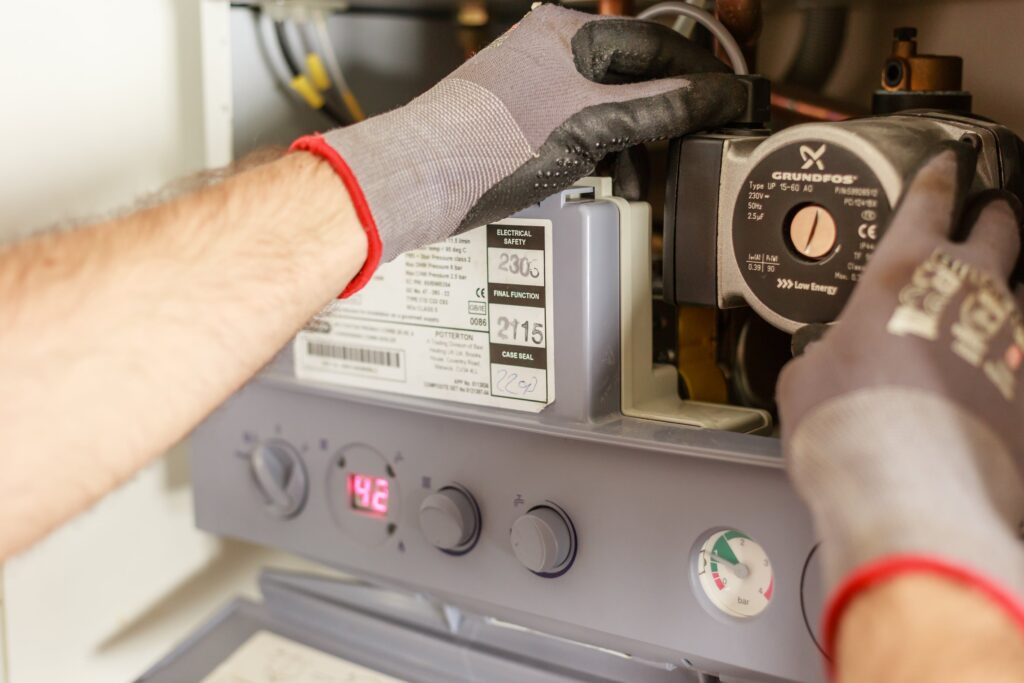A boiler is one of the components of a radiant heating system in a house. It is just one of the ways to incorporate the “H” into a home’s HVAC system, which stands for heating, ventilation, and air conditioning. It is simply a device that warms the water and distributes the heated water or steam over pipes and radiators to maintain the desired temperature.
How To Fix a Boiler
Typically, they position boilers in the basement. They are particularly prevalent in historic houses and areas with cooler weather. Due to its central position and capacity to distribute heat uniformly throughout a house, a boiler may be a critical component of a central heating system – but not every home has one. Boilers will heat only properties with hot water radiators or steam radiators. You certainly have a furnace if you have air registers on your house’s floors, walls, or ceilings.
In industrial contexts, larger, more powerful boilers also act as a source of heat and as steam generators to power machines.
How Is a Boiler Operated
As previously said, boilers heat houses using hot water or steam. However, how precisely do they do this?
Depending on the boiler, a fuel source such as propane, oil, or natural gas burns within an insulated chamber, heating the heat exchanger’s coils. Cold water heats up as it flows through these coils. Next is whether your house has steam or hot water radiators.
In the case of a water heater, the circulator pump located at the boiler’s side will activate when the thermostat setting demands it, pushing heated water through pipes and out to the radiators around your house. The heat is transferred from the water to the radiator’s metal components and radiates across the room. Modern systems will be zoned, allowing for autonomous management of various locations. As the water circulates through the system, it cools and then returns to the boiler to reheat.
Steam radiators are more straightforward to install since they do not need a circulating pump. Rather than that, they use the “hot air rises” idea. Water steam rises through the system to radiators on the upper floors, and cooled-off condensation drips back down the pipes for reheating.
Because boilers use radiant heat rather than pumping hot air into rooms, they often provide a more steady and pleasant heat level.
Steam Boilers
Steam boiler systems are well-known for their durability. Indeed, the average steam boiler has a life expectancy of 30 years or more.
Steam boilers are more fickle than hot water boilers. They depend on air pressure, which must be maintained steady for heat to circulate correctly. If there is a problem with the heating element, the water will not reach the temperature necessary to produce steam, and the heat will not get to your rooms.
Historically, they often constructed steam boiler systems with a single pipe since they were more straightforward and less costly to manufacture. A single-pipe system is capable of providing enough heat for relatively small areas. However, suppose you have built onto your house or building. In that case, your plan may not generate enough steam to adequately heat the new additions, necessitating system maintenance or the installation of extra pipes.
A steam boiler system is entirely reliant on a network of air valves and vents. If any valves fail to operate correctly or if any of the vents get clogged, heat will be unable to reach your rooms. You may modify the steam flow rate to ensure that each radiator generates the appropriate amount of heat for the room.
Following Approach if System Continually Fails
Your system has safety features that automatically cut off the fuel supply if the pressure or the water level is too low. If your system continually fails due to insufficient levels, you might use the following approach:
- Inspect the water supply and fuel supply.
- Ensure that exhaust is appropriately vented
- Adjust equipment to the proper levels
- Mineral deposit system that is continuous
- Replace any defective valves
It would be best to operate all combustion equipment safely to avoid hazardous circumstances or catastrophes that result in human harm or property loss. Igniting a flammable gas collected inside the boiler causes boiler explosions. This condition may occur in various ways, including when the supply of fuel, air, or ignition disrupts, the flame goes out, and flammable gas collects and rekindles. Another example is when a series of failed lighting attempts occur without sufficient purging of stored combustible gas.
A boiler has an enormous quantity of stored energy. Energy is released when superheated water changes from a hot liquid to a vapor (steam). For instance, when water converts to smoke, it expands to 1600 ft3. Thus, if you were to catch all of the energy produced when a 30-gallon household hot water tank flashes into catastrophic failure at 332oF, you would have enough power to launch an ordinary automobile (2,500 lbs) approximately 125 feet into the air. It is greater than the height of a 14-story apartment building, commencing at an 85-mile-per-hour lift-off velocity!”.
It would be best to examine boilers regularly, following the manufacturer’s instructions.
Also, it would be best to investigate the pressure vessel’s integrity, the safety relief valves, the water cutoff mechanisms, and the appropriate working of the floats, gauges, and water level indicators. The boiler’s fuel and burner system must undergo inspection and maintenance regularly to guarantee optimal operation, heat transmission, and appropriate flame detection.
What To Do if Your Boiler Malfunctions
When a boiler fails, it may be unpleasant, uncomfortable, and even deadly in the dead of winter. You’ll want to have your boiler back up and run as quickly as possible to continue living comfortably – and bathing comfortably.
However, boiler fix and repairs may be rather pricey. However, boilers often omit ordinary house insurance plans despite their critical nature and high cost.
What To Do Immediately After a Boiler Breakdown
When your boiler fails, your house begins to chill, or your water becomes cold, panic is natural.
Here’s how to get the issue under control:
Identify a failing or broken boiler: If you experience a loss of heat or hot water, you’ll soon realize your boiler has failed. However, you should be aware of more sick or malfunctioning boiler indications. Failure to recognize them might be expensive, if not dangerous. Among these indicators are the following:
- a pilot light or flame that is orange, yellow, or languid. The pilot lights should be bright blue. Additionally, keep an eye out for a pilot light that keeps going out.
- clattering or hammering sounds
- like erratic water pressure, which is often excessive
- condensation or a rise in condensation in the room, a surge in gasoline consumption (as seen on your latest gas bill, or, if you have a smart meter, more immediately on your in-home display). It is an indication that the boiler is not operating as effectively as it should.
If any of these symptoms appear on the boiler, turn it off immediately.
Please take note of the boiler’s error code: Before you turn it off, check to see whether the boiler’s digital display is showing an error code. This number may assist a specialist in diagnosing the issue.
Check supplies: If your boiler is not working correctly, check to ensure that it receives enough gas, power, and water supply. Check whether other gas appliances, such as ovens and stoves, are functioning correctly in your house. If not, you may be experiencing a gas supply issue and should contact your gas transportation network. Additionally, verify that your boiler is in place.
How to be safe if your heater fails
Rarely, a faulty boiler may result in significant sickness, fires, and even death. Typically, boilers are equipped with safety features such as pressure release valves, oxygen depletion sensors, and overheat protection that instantly shut down the boiler if anything significant goes wrong. However, it is prudent to be aware of the warning indicators associated with a boiler.
Warning signs
- odor of used gas or fumes
- scorch scars, soot stains, and black spilled marks
- Do you smell gas? It is critical to switch off the boiler if you smell gas or suspect a gas leak.
Recognize the symptoms and signs of carbon monoxide poisoning: Carbon monoxide may swiftly sicken and kill. Carbon monoxide detectors should be fitted and operational, but you should also be aware of the signs of exposure. These include the following:
- a headache resembling stress
- tiredness
- confusion
- dizziness
- dizziness and nausea
- stomach ache
- breathlessness
Maintain a comfortable temperature: If your boiler fails during the winter, you’ll need to take care to maintain a comfortable temperature without central heating. It is particularly critical for the elderly, youngsters, and individuals who suffer from chronic illnesses. Layer up, pull the curtains, use hot water bottles, and move to a family member’s or friend’s house or a motel if you feel frightened.
If necessary, evacuate the premises: If you smell gas, exhibit signs of carbon monoxide poisoning, or are told by an expert to do so, you should vacate the property and seek shelter elsewhere until the boiler gets the fix.
Who to call for fix if your boiler or heater fails?
As with any other gas equipment, never attempt to repair or fix your boiler independently. It is not only unsafe, but it may void any warranty or insurance coverage you have on it. If you have a warranty or insurance coverage, the conditions of the agreement will state who you should contact for repairs.
In any event, you should always use the services of a licensed Gas Safe engineer.
When you first call the engineer via phone, inform them of the boiler’s make and model and any problem codes. They may walk you through a few steps over the phone to assist you in resolving typical minor boiler difficulties, such as low pressure, frozen condensate pumps, out-of-service pilot lights, and improper boiler or thermostat settings. They’ll also be able to determine whether the condition is hazardous, if the boiler requires urgent repair, or if you need to evacuate the property based on your information.
If the manufacturer’s guarantee still covers your boiler fix
Numerous boilers come with a manufacturer’s warranty or guarantee, which is a period during which the manufacturer will fix and repair any actual faults with the boiler for free. Almost all boilers on the market come with a one-year warranty, and an extended warranty is sometimes available for an additional fee. These typically protect your boiler for two to ten years.
If your boiler is still under warranty, the manufacturer’s authorized specialists must perform all repairs. Engaging another party will void the warranty.
If your boiler breaks down, you should first call the manufacturer, who will dispatch a service specialist to your house.
If your boiler has a cover
Boiler cover is a kind of insurance coverage that covers the cost of fix, repairing, or even replacing a boiler if it develops a defect. You may use several things on the market as a ‘boiler cover.’
How to avoid future boiler breakdowns
Any residue on the boiler’s heat transfer surfaces, such as soot or scale, reduces efficiency and increases equipment failure probability. According to the manufacturer’s instructions, it is critical to clean this surface to ensure optimal boiler performance and equipment life. A residue covering the tubes of a boiler will obstruct heat transmission and raise the flue gas temperature. If there is insufficient combustion, soot collects on the combustion side of the lines. Similarly, inadequate water treatment might result in scale buildup on the waterside of the tubes.
Insulation of steam and condensation pipework is crucial. Pipes, fittings, and valves that are not insulated incur a significant energy penalty. Protecting any surface with a temperature higher than 130oF is typically cost-effective. Uninsulated steam, condensate, and hot water pipes in climate-controlled buildings result in a twofold penalty since extra air conditioning must eliminate the heat loss from the lines.
The most effective approach to avoid expensive, inconvenient, and sometimes hazardous boiler breakdowns is to get your boiler serviced regularly. Indeed, you should have any gas appliances in your house inspected and maintained by a Gas Safe trained engineer every year. To keep the validity of your manufacturer’s warranty, extended warranty, or boiler protection, you’ll need to get your boiler serviced. Specialist boiler cover packages should provide complimentary yearly service and cleaning.




Recent Comments